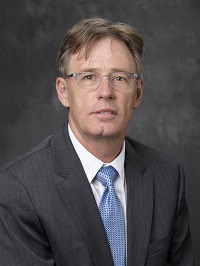Peter Hirst is professor of horticulture at Purdue University, where he has served on the faculty since 1997. He received a BHortSci degree from Massey University in New Zealand and a PhD degree from The Ohio State University. His research has focused on the physiology, genetics and management of fruit trees, in particular apple. In recent years, his research has concentrated on understanding and manipulating flowering initiation which is a necessary precursor to reliable cropping, and on fruit development. Other areas of emphasis include the application of robotics and sensing technologies to fruit orchards, and the development of predictive computer simulation models of growth and fruiting for educational and research applications. In his position as state extension specialist, Professor Hirst translates research data into strategies able to be implemented by growers. He is a guest professor at the Northwest Agricultural and Forestry University in China, and a Fellow of the American Society for Horticultural Science. He has served on the board of a number of national scientific and industry organizations. Dr. Hirst has also been involved in addressing capacity building and food security in both Africa and Asia. Research results and recommendations have been presented to scientists and farmers in many countries including Armenia, Australia, Canada, China, Egypt, Kyrgyzstan, Mexico, New Zealand, Tajikistan, and Zambia. USAID Profile
Bureau for Food Security
Office of Country Strategy & Implementation
Peter Hirst is a member of the Country Strategy and Implementation team within the Bureau for Food Security. He is investigating strategies to increase meaningful youth inclusion in USAID’s programs internationally. Many developing countries have a youth bulge where over 60% of the population is under the age of 29, compared with less than half that rate in industrialized countries. Furthermore, youth have a disproportionately high unemployment rate. Peter is working on strategies to reduce youth unemployment and increase their status in terms of economic growth, social stability, education and health.
|




